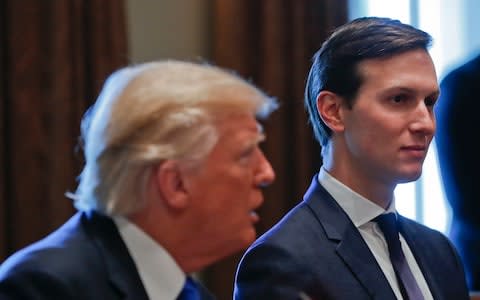'Peace deal' hopes damaged after Abbas cancels Pence talks over Jerusalem decision

Donald Trump’s hopes of brokering an Israeli-Palestinian peace deal were fraying as the Palestinian president announced he would refuse to meet the US vice president in protest at the White House’s decision on Jerusalem.
An aide to Mahmoud Abbas, the Palestinian leader, said he was cancelling a meeting with Mike Pence, the US vice president, because America had “crossed all the red lines with the Jerusalem decision”.
"There will be no meeting with the vice president of America in Palestine,” said Majd al-Khalidi, a diplomatic advisor.
The snub is in the first time in memory that Mr Abbas, a political moderate who is committed to non-violence and to a two-state solution, has refused to meet with a senior American leader.
The head of Egypt's Coptic Church, head Pope Tawadros II, and a leading Egyptian Muslim cleric also cancelled meeting with Mr Pence in Cairo in protest at Washington's decision.
Two Hamas fighters were killed by an Israeli airstrike carried out early Saturday and launched in response to rockets fired into Israel from Gaza. Two Palestinian men in Gaza were shot dead by Israeli troops on Friday during protests.
Palestinian demonstrators also clashed with Israeli police in Jerusalem on Saturday on the third consecutive day of unrest since Mr Trump’s announcement the US was recognising Jerusalem as Israel’s capital.
Despite the violence, Jared Kushner is gambling that the fall out from the decision will be brief and he can still present his much vaunted plan to secure the "ultimate peace deal" early in the new year.
Mr Kushner believes that protests would dissipate and after a "cooling off period" the way would be clear for negotiations, according to Politico.
Some suggested President Donald Trump's decision this week to recognise Jerusalem as the Israeli capital, and to move the US embassy there from Tel Aviv, had trampled on Mr Kushner's fledgling efforts at a peace process.

But advisers to the president's son-in-law indicated he had in fact been the key person pushing for the move.
Amid the internal rivalries of the White House the dramatic shift in US policy represented a short-term victory for Mr Kushner over Rex Tillerson, the Secretary of State.
Those close to Mr Kushner indicated he accepted the stakes and knew if he was right, and the embassy move had no long term impact on the peace process, then he would be a "hero," but if he was wrong he may be “doomed".
Mr Kushner, 36, who is being called the "de facto ambassador to Israel and the Palestinians" by administration insiders, was said to have "poured his heart and soul" into peace efforts in recent months. Speaking days before the decision to move the embassy, in a rare public appearance in Washington, he admitted: "You see a lot of reasons why this deal could go south very quickly, and there’s a ton of distractions that come up.
"My team deals every month with maybe three or four different issues that will come up, and everyone says 'This is the end of it if it doesn't work’."
As violent protests erupted in the Middle East Mr Tillerson was markedly less enthusiastic about the embassy move.

Speaking in Paris, he said: "This will take some time. We have to acquire a site, we have to develop building plans, construction plans, ensure we get the authorisations, and then actually build an embassy.
"So this is not something that’s going to happen this year, probably not next year." Asked if the US accepted that part of Jerusalem falls under Palestinian control, he said the president's comments "did not indicate any final status for Jerusalem”.
Mr Kushner is said to have become increasingly determined to make bold moves in the Middle East as his wide ranging portfolio and role in the White House has been reined in by chief of staff John Kelly, and his name has increasingly been dragged into the Russia investigation led by special counsel Robert Mueller.
He is said to see it as the issue where he can break though with a major achievement. The decision to move the embassy earned favour with with pro-Israel Republican donors like the casino billionaire Sheldon Adelson.
Profile | Mahmoud Abbas
The Republican Jewish Congress, funded by Mr Adelson, published a full-page advertisement in The New York Times which read: "President Trump: You Promised. You Delivered”.
Mr Kushner's gamble reportedly followed pressure from Mr Trump for options two weeks ago as he considered whether to sign a waiver which would put off moving the embassy.
The waiver has been signed by US presidents every six months for two decades.
Those backing Mr Kushner's move were also convinced that regional concerns about containing Iran would override consternation at the embassy shifting to Jerusalem.
But former Middle East negotiator Aaron David Miller said: "The problem is we just don't know what the Trump Administration's peace process strategy is. And in the absence of a coherent one the Jerusalem gambit appears to be a one-off.
"It is likely to be far more trouble than it's worth, adding another layer of complication to a peace process that already faces long odds."

